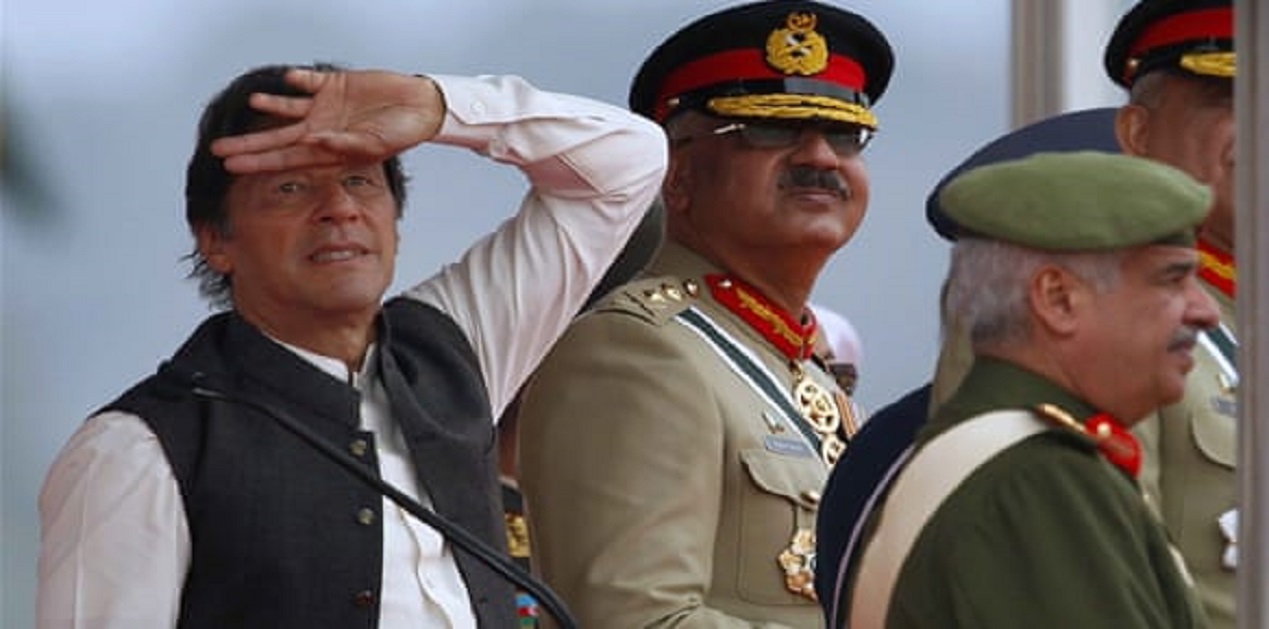The year 2019 brought optimism as well as trials for Pakistan in equal measure. In 2019, Pakistan under Prime Minister Imran Khan was occupied in confronting numerable challenges at the domestic as well as international levels. At the domestic front, the situation remained grim for Pakistan as the government under Prime Minister Imran Khan struggled to live up to the promises it made during its election campaign. The economic troubles of Pakistan worsened in 2019 and the country grappled with a huge Balance of Payment crisis, high inflation, and low employment rate which in turn triggered political turmoil in the country.
The GDP growth of Pakistan slowed down to 3.3 percent in FY19, which was a 2.2 percentage decline since 2018. Further, the industrial, as well as the service sector, also experienced a decline in the growth rate. The industrial sector grew at 1.4 percent in FY19 as compared to 4.9 percent in FY18; whereas, the service sector experienced a growth rate of 4.7 percent in FY19, which was 1.5 percent lower than what it achieved in FY18. In the midst of this lower economic growth, the country managed to improve its Current Account Deficit (CAD) and began recovering its international reserves. The CAD declined from USD 19.9 billion in FY18 to USD 13.5 billion in FY19 largely because of lower import growth.1
At the same time, the timely aid by China, UAE, Saudi Arabia, IMF, and other multilateral organizations helped Pakistan in improving its international reserves to USD 10.8 billion by November 2019 from USD 7.6 billion in January 2019.2 According to World Bank estimates, as the Pakistan government tightens fiscal and monetary policies, the real GDP growth will decelerate to 2.4 percent in FY20.3
The economic woes of the country naturally had repercussions at the domestic front. In 2019, Imran Khan Government was immersed in firefighting the situation created by a poor economy which was further exacerbated by poor governance. Apart from economic woes, another major challenge that Pakistan tackled in 2019 was circumventing the Financial Action Task Force (FATF) blacklist. Pakistan once again dodged the blacklist in October 2019 when the FATF sternly urged the country to complete its action plan by February 2020. In its verdict, FATF noted “serious concerns with the overall lack of progress by Pakistan to address its TF (terrorist financing) risks, including remaining deficiencies in demonstrating a sufficient understanding of Pakistan’s transnational TF risks, and more broadly, Pakistan’s failure to complete its action plan in line with the agreed timelines and in light of the TF risks emanating from the jurisdiction.”4 It was only the support given by China, Turkey, and Malaysia, which enabled Pakistan to evade the FATF blacklist. Otherwise, entering the blacklist of FATF would have been deeply troubling for Pakistan’s already debt-ridden economy.
On the foreign policy front, 2019 proved to be a year of mixed success for Pakistan. After years of strained relations with the US, President Trump initiated the thawing of relations by seeking Pakistan’s help in bringing the Afghan Taliban towards a more compromising position over the peace process. Once again, Pakistan’s centrality in solving the Afghan conundrum proved vital in improving its relations with the US. Further, Imran Khan Government was also able to provide temporary relief to a plummeting economy by borrowing approximately USD 10.40 billion from friendly countries like China, Saudi Arabia, and UAE which was used for the repayment of old loans and stabilize the foreign exchange reserves. By the end of the year, Pakistan again received USD 1.3 billion loans from the Asian Development Bank (ADB) to shore up the slowing economy. The disbursement of loans by the ADB is a part of a multi-donor economic reform program led by the IMF to stabilize Pakistan’s economy.
However, despite these short-term gains made by Pakistan’s diplomacy in keeping the economy of the country afloat, the real challenge which the country faced was in relation to India. Throughout the year, the policymakers and the diplomatic circle of Pakistan were involved in finding ways of dealing with a more assertive and confident India at its borders. The decision of the Indian government to go ahead with the Balakot strikes in February 2019 and revocation of the special status of Jammu and Kashmir in August 2019 pushed the Imran Khan government on the back-foot at domestic as well as international levels. Pakistan’s desperate attempts to rally support against India on these issues found no resonance among the international community.
The end of 2019 also brought another major limitation of Pakistan's foreign policy to the forefront i.e. its subservience to Saudi Arabia. Prime Minister Imran Khan’s decision to skip the Kuala Lumpur summit at the behest of Saudi Arabia hints at the economic hold of the Gulf Kingdom over the foreign policy of Pakistan. Interestingly, Imran Khan had previously given his full support to the event organized by Malaysia’s Prime Minister. However, Riyadh’s antagonism towards the summit which is perceived as challenging the supremacy of Saudi-led OIC in the Muslim world has kept Pakistan away from the summit.
The year 2019 ended for Pakistan with more internal turmoil as it tainted the image of the army as the most powerful institution of the country. The row over Imran Khan Government to give an extension to Army Chief General Qamar Javed Bajwa till 2022 hints at increasing disagreement within the army against this decision as it will impact the career and promotion of 20 Army Generals. 5 If the division within the Pakistan army over the extension of Army Chief is true then it unfolds a dangerous trend in Pakistan military as it threatens the chain of command, the core strength of any armed force. Further, the death sentence was given by a special court to former Military ruler Pervez Musharraf on treason charges further challenged the invincible image of Pakistan military within the country. Although the decision giving death sentence by the special court was called unconstitutional by the Lahore High Court, however, it remains unclear whether it nullifies the death sentence or not. In any case, the mounting challenge for the army from within the institution and by domestic democratic forces has the potential of further destabilizing the country.
The coming year will further test the perseverance of Imran Khan Government against these innumerable challenges. Pakistan’s relations with India are difficult to improve in the coming year given the complete deniability and lack of response from the Pakistani state to assuage India’s concerns on cross-border terrorism. Further, the continued interference by Pakistan in the internal affairs of India, notably, the revocation of the special status of Kashmir has further strained the relations. Pakistan, with the help of China, has raised the issue of Kashmir in the UN Security Council twice since August 2019. Although India has invited Prime Minister Imran Khan for the upcoming SCO summit due to be held in New Delhi, it is highly unlikely that it will result in thawing of relations between India and Pakistan. Further, Pakistan’s relations with the US might improve in the coming year especially given the urgency with which the Trump administration wants to sign a peace deal with the Taliban and withdraw its troops from Afghanistan. However, the most difficult challenge for Pakistan in the coming year will be the revival of its economy. If Pakistan is able to revive and stabilize its economy in the coming year then it will be better positioned to deal with the growing domestic turmoil and rapidly changing global order.
References
- World Bank, URL: https://www.worldbank.org/en/country/pakistan/overview#1
- CEIC, Pakistan Foreign Exchange Reserves, URL: https://www.ceicdata.com/en/indicator/pakistan/foreign-exchange-reserves
- World Bank, URL: https://www.worldbank.org/en/country/pakistan/overview#1
- Anil Padmanabhan, FATF meet verdict: Pakistan’s people deserve better, Livemint, 20 October 2019, URL:https://www.livemint.com/opinion/columns/fatf-meet-verdict-pakistan-s-people-deserve-better-11571591868763.html
- Dipanjan Roy Chaudhary, Imran Khan’s extension to Pakistan Army Chief Bajwa to affect 20 Generals, Economic Times, 15 January 2020, URL: https://economictimes.indiatimes.com/news/defence/imran-khans-extension-to-army-chief-gen-q-a-bajwa-to-affect-20-generals/articleshow/73237690.cms
(The paper is the author’s individual scholastic articulation. The author certifies that the article/paper is original in content, unpublished and it has not been submitted for publication/web upload elsewhere, and that the facts and figures quoted are duly referenced, as needed, and are believed to be correct). (The paper does not necessarily represent the organisational stance... More >>
Image Source: https://www.aljazeera.com/amp/indepth/opinion/pakistan-economy-sinking-190628174320798.html










Post new comment